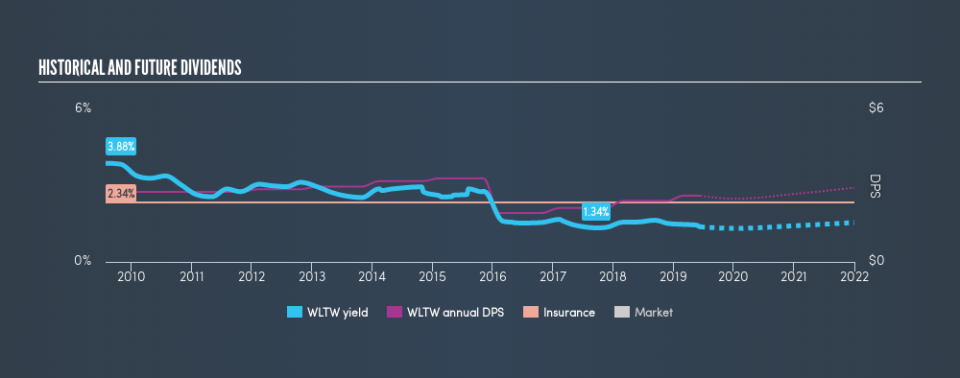Is Willis Towers Watson Public Limited Company (NASDAQ:WLTW) A Smart Pick For Income Investors?

Want to participate in a short research study? Help shape the future of investing tools and you could win a $250 gift card!
Is Willis Towers Watson Public Limited Company (NASDAQ:WLTW) a good dividend stock? How would you know? Dividend paying companies with growing earnings can be highly rewarding in the long term. On the other hand, investors have been known to buy a stock because of its yield, and then lose money if the company's dividend doesn't live up to expectations.
A slim 1.4% yield is hard to get excited about, but the long payment history is respectable. At the right price, or with strong growth opportunities, Willis Towers Watson could have potential. The company also bought back stock during the year, equivalent to approximately 2.3% of the company's market capitalisation at the time. Some simple analysis can reduce the risk of holding Willis Towers Watson for its dividend, and we'll focus on the most important aspects below.
Click the interactive chart for our full dividend analysis
Payout ratios
Dividends are typically paid from company earnings. If a company pays more in dividends than it earned, then the dividend might become unsustainable - hardly an ideal situation. As a result, we should always investigate whether a company can afford its dividend, measured as a percentage of a company's net income after tax. Looking at the data, we can see that 42% of Willis Towers Watson's profits were paid out as dividends in the last 12 months. This is a middling range that strikes a nice balance between paying dividends to shareholders, and retaining enough earnings to invest in future growth. One of the risks is that management reinvests the retained capital poorly instead of paying a higher dividend.
We update our data on Willis Towers Watson every 24 hours, so you can always get our latest analysis of its financial health, here.
Dividend Volatility
One of the major risks of relying on dividend income, is the potential for a company to struggle financially and cut its dividend. Not only is your income cut, but the value of your investment declines as well - nasty. Willis Towers Watson has been paying dividends for a long time, but for the purpose of this analysis, we only examine the past 10 years of payments. The dividend has been cut by more than 20% on at least one occasion historically. During the past ten-year period, the first annual payment was US$2.76 in 2009, compared to US$2.60 last year. Dividend payments have shrunk at a rate of less than 1% per annum over this time frame.
When a company's per-share dividend falls we question if this reflects poorly on either the business or management. Either way, we find it hard to get excited about a company with a declining dividend.
Dividend Growth Potential
With a relatively unstable dividend, it's even more important to see if earnings per share (EPS) are growing. Why take the risk of a dividend getting cut, unless there's a good chance of bigger dividends in future? Willis Towers Watson's EPS are effectively flat over the past five years. Over the long term, steady earnings per share is a risk as the value of the dividends can be reduced by inflation. Willis Towers Watson is paying out less than half of its earnings, which we like. Earnings per share growth have grown slowly, which is not great, but if the retained earnings can be reinvested effectively, future growth may be stronger.
Conclusion
To summarise, shareholders should always check that Willis Towers Watson's dividends are affordable, that its dividend payments are relatively stable, and that it has decent prospects for growing its earnings and dividend. We're glad to see Willis Towers Watson has a low payout ratio, as this suggests earnings are being reinvested in the business. Unfortunately, earnings growth has also been mediocre, and the company has cut its dividend at least once in the past. Willis Towers Watson might not be a bad business, but it doesn't show all of the characteristics we look for in a dividend stock.
Companies that are growing earnings tend to be the best dividend stocks over the long term. See what the 13 analysts we track are forecasting for Willis Towers Watson for free with public analyst estimates for the company.
Looking for more high-yielding dividend ideas? Try our curated list of dividend stocks with a yield above 3%.
We aim to bring you long-term focused research analysis driven by fundamental data. Note that our analysis may not factor in the latest price-sensitive company announcements or qualitative material.
If you spot an error that warrants correction, please contact the editor at editorial-team@simplywallst.com. This article by Simply Wall St is general in nature. It does not constitute a recommendation to buy or sell any stock, and does not take account of your objectives, or your financial situation. Simply Wall St has no position in the stocks mentioned. Thank you for reading.

 Yahoo Finance
Yahoo Finance 
